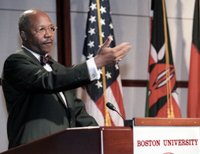Africa’s Troubled Past, Hopeful Future
APARC celebrates five years with transcontinental conference

Charles Stith, founder and director of Boston University’s African Presidential Archives and Research Center (APARC), says there’s a reason that 1960 has been called “the year of Africa”: that year, 17 countries on the continent gained independence from colonial rule.
Stith considers that period of time the most important era in modern African history. But the second most important, he says, is now.
“I believe that if in 100 years you want to understand why some countries on the continent flourished while others floundered,” the international relations research professor and former U.S. ambassador to Tanzania says, “it’s the next 20 to 30 years that you want to zero in on.”
That’s one reason that Stith has chosen leadership as the central issue to be discussed at APARC’s fourth African Presidential Roundtable on April 17, an event that will use a transcontinental simulcast to connect speakers in Los Angeles, Boston, and Johannesburg, South Africa. The simulcast, titled Leadership Matters, is being held in the Trustees Ballroom at One Sherborn St., and is part of a two-day event that marks the fifth anniversary of APARC and brings U.N. Deputy Secretary General Asha-Rose Migiro to Boston University.
In the 47 years since that year of Africa, says Stith, several African nations, such as Ghana, have flourished in a democratic environment, but many others have not. In Zimbabwe, for example, a country with an 80 percent unemployment rate, Roman Catholic bishops recently threatened an “open revolt” if President Robert Mugabe did not guarantee free and fair elections.
“During the time of independence, the critical question for leadership was, ‘How do we get our countries back?’” says Stith. “In this era, the critical question is, ‘Now that we have our countries back, how do we make them work?’”
The answer, he believes, is by encouraging leadership dedicated to the democratic process, something that is in short supply on the African continent. By Stith’s count, only 15 of 47 countries in sub-Saharan Africa are currently led by leaders committed to democratization and a free market economy.
“The good news,” he says,” is that two-thirds of the population of the continent resides in these 15 countries, which means that the vast majority of Africans wake up every morning in countries where they participate in the governance of their countries and are in economies where there are increasing options for them to realize their potential.”
Stith hopes that discussions like the simulcast planned for Tuesday’s roundtable will help nudge the African continent toward democracy. Among the former African heads of state participating are Nicephore Dieudonne Soglo, of Benin, Sir Q. Ketumile J. Masire, of Botswana, Flight Lieutenant Jerry Rawlings, of Ghana, Daniel arap Moi, of Kenya, Karl Auguste Offmann, of Mauritius, and Kenneth Kaunda, of Zambia.
“To engage people on two continents in three cities and to have the kind of high-powered individuals that we’re recognizing as participants is a great way to celebrate our five years,” says Stith. “It’s also a great way to punctuate the fact that we do have a global reach and we do have a great deal of credibility on the continent and in this country.”
During the simulcast, APARC will recognize four distinguished leaders: in Boston, Asha-Rose Migiro, of Tanzania, for her appointment as U.N. deputy secretary general in February; in Los Angeles, Bishop Charles E. Blake, for his work as the CEO and founder of Save Africa’s Children; in Johannesburg, His Excellency Joaquim Chissano, former president of the Republic of Mozambique, for his establishment of Africa Forum; and also in Johannesburg, Thabo Mbeki, president of South Africa, for his role as deputy president during the presidency of Nelson Mandela.
“If Nelson Mandela is considered the George Washington of South Africa, then Thabo Mbeki would certainly be the equivalent of Thomas Jefferson,” Stith says.
During the two-day celebration, which is expected to attract 200 people to the BU simulcast alone, APARC will also hold discussions on leadership with experts such as Walter Fluker, a professor of philosophy and religion at Morehouse College and executive director of its Leadership Center, and with 12 former African heads of state.
“Our hope,” says Stith, “is that some of the young people who participate in this two-day event, in addition to becoming further enlightened, will also be inspired to look for new ways and creative ways to serve.”
In addition to hosting roundtable discussions, APARC continues to develop its collection of African political papers and to build its Balfour President-in-Resident program, bringing former democratic African heads of state to BU for extended visits to exchange thoughts and ideas on a developing Africa.
For more information on APARC, visit www.bu.edu/aparc.